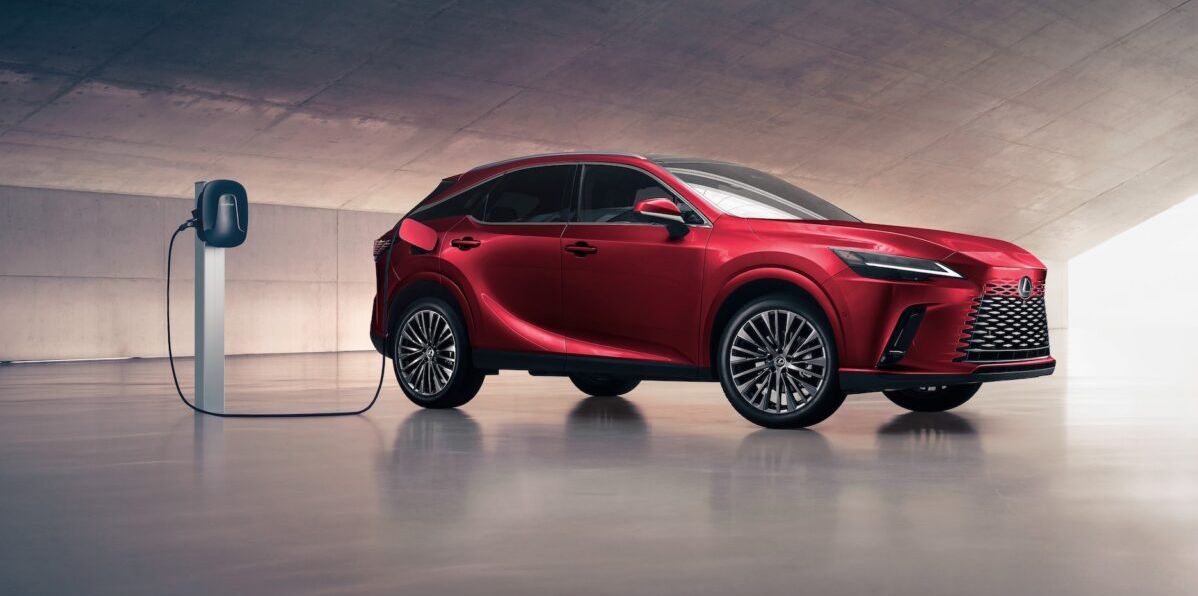
Over the last two decades, the emergence of hybrid, hybrid plug-ins, and electric vehicles has transformed the automotive industry. As a new vehicle shopper, you can now choose new, future-forward vehicles that benefit from reduced fuel consumption and lower emissions, along with the tremendous on-road performance you’ve always expected from Lexus. But what is a hybrid or hybrid plug-in vehicle, and how do they compare to an electric vehicle? In this concise guide, we’ll explain the need-to-know differences between hybrid, hybrid electric, and electric cars to help you choose the Lexus that’s right for you.
What Is a Hybrid Vehicle?
Hybrid or hybrid electric vehicles have an internal combustion engine (ICE) and an electric motor with a battery pack, which means they can run on fuel or electricity, usually only burning gasoline or diesel when needed. By automatically alternating between these two power sources, a hybrid vehicle can achieve outstanding fuel efficiency, particularly in urban settings where there is a lot of stop-and-go driving.
You don’t need to plug your vehicle in with a conventional hybrid. The vehicle battery is recharged by motors within the car, particularly when braking. Suppose you have a battery, electric motor, and ICE onboard; this limits the size and capacity of your battery, restricting the maximum battery-powered driving range.
What Is a Plug-In Hybrid Electric Vehicle?
Plug-in hybrid electric vehicles possess a battery that you can charge externally by plugging it in, just like an electric vehicle. Plug-in hybrid electric vehicles typically have a bigger battery than a basic hybrid vehicle and a much longer battery-powered driving range. They’ll utilize their all-electric driving range until the battery runs low. At this point, the car switches over to gas-powered driving, operating like a standard hybrid vehicle.
Plug-in hybrid electric vehicles are a true middle ground between a conventional ICE vehicle and an electric vehicle. They offer a much greater electric driving range, operating like a standard electric vehicle, with a gas engine backup for longer journeys and higher speeds. With an ICE, plug-in hybrids have a much greater range, providing peace of mind that your vehicle won’t run out of charge. But, like an electric vehicle, the plug-in hybrid electric battery will need daily charging, which keeps your vehicle’s gasoline requirements low.
What Is an Electric Vehicle?
Electric vehicles are 100% electric powered. They possess an electric motor that gets its power from an onboard battery. You charge the battery externally via a domestic outlet or dedicated charging point while on the move. These zero-emission vehicles have a driving range determined by the battery’s size, measured in kilowatt-hours. For example, a 32.6 kWh battery can deliver a driving range of up to 150 miles. A 100 kWh battery can power an electric driving range of over 400 miles.
The availability and speed of charging an electric vehicle are the most critical limiting factors for its performance. While you can charge these vehicles via a regular power outlet, known as level-one charging, the process can take a long time. A solution is to use dedicated power outlets that deliver quicker, level-two charging. However, this requires the added expense of installing a suitable outlet or using charging stations.
Hybrid vs. Plug-In Hybrid vs. Electric Vehicles: Which One’s Right for You?
If you’re thinking about hybrid and electric vehicles, you clearly understand some of the benefits of electric-powered driving. It’s simply a question of whether or not you want to retain some gas-powered driving with your vehicle. Electric vehicles depend on timely access to charging. Over time, the capacity of the battery and driving range on a full charge will diminish, especially if you routinely drive at highway speeds.
Opting for a hybrid electric vehicle means you’ll have the security of an ICE and gas-powered driving should your electric range diminish. Hybrid and plug-in hybrid electric vehicles also provide the convenience of not being dependent on charging stations, so you won’t need to search for charging stations on your road trips.
Are Plug-In Hybrid Electric Vehicles Worth It?
Convenience is the most essential factor when considering hybrid vs. plug-in hybrid electric cars. Plug-in hybrid electric vehicles are a great choice if you want to reduce emissions without committing to an all-electric car. As the owner of a plug-in hybrid electric vehicle, you may also be eligible for federal tax credits, which aren’t available to hybrid vehicle owners.
However, regular hybrid vehicle owners don’t have to deal with the burden, responsibilities, and additional upfront costs associated with charging their vehicles. They also get better fuel economy for highway driving, as the battery depletes faster at higher speeds. Standard hybrid models are also more common, varied, and often less expensive than plug-in hybrid electric vehicles.
A plug-in hybrid electric vehicle that you primarily use for short journeys is a great choice for a commuter or family ride. You’ll need to charge it every day, and as long as your journeys are within the range of the plug-in hybrid vehicle you choose, you shouldn’t need to head to the gas station too often.
Talk to Lexus of Stevens Creek About Your Hybrid, Plug-In Hybrid, or Electric Vehicle Requirements
Visiting our dealership on Stevens Creek Boulevard in San Jose, California, is the best way to establish which vehicle type is best for you. We’re on hand to show you our impressive inventory of hybrid, plug-in hybrid, and electric vehicle models, taking you through an in-depth comparison, including tax credits and other federal benefits that may be available. Our team is available to walk you through all your options and looks forward to offering some outstanding vehicles for you to take out for test drives. Please feel free to reach out to us today.




